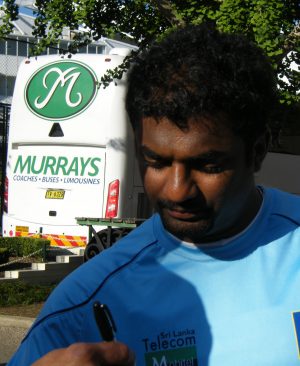On October 13, the Indian movie production company Dar Motion Pictures released a poster for the movie “800” through social media platforms. The film is based on an autobiography of Sri Lankan cricket legend Muttiah Muralitharan, who held the world record for obtaining 800 wickets in test matches – hence its title. The movie was scheduled to be released through the Indian Tamil film industry, with Vijay Sethupathi as the protagonist. Soon after the movie poster’s release, protests erupted in the Tamil community, who demanded that Sethupathi should not glorify Muralitharan and his anti-Tamil opinions.
Why has a movie about a cricket legend triggered a controversy? Apparently, if rumors are to be believed, the film portrays the Sri Lankan government in favorable light, thus angering the Tamil community. Prior to commencement of filming last year, Tamil Nadu had witnessed several protests. During a press conference, Sethupathi requested the public to not to judge the movie before the release. Despite this, the Tamil community has remained dissatisfied.
The controversy isn’t focused on the movie itself, but instead around Muralitharan. The latter is regarded as a “traitor” by the Tamil community, as he is viewed to be supportive of the Sri Lankan government and specifically the Rajapaksa brothers. The Liberation Tigers of Tamil Eelam (LTTE) were brutally crushed in May 2009 ending a long civil war in Sri Lanka. At the time, the Sri Lankan government was under President Mahinda Rajapaksa, who is now prime minister. His younger brother, Gotabaya Rajapaksa, defense secretary when the war ended, is the current president of Sri Lanka. Both brothers are accused of having committed human rights violations against the Tamils in their quest to end the war on favorable terms.
Since the end of war, Muralitharan has established close contact with the Rajapaksa brothers. He participated in Gotabaya’s election campaign in 2019. Muralitharan has also supported his younger brother Muttiah Prabhakaran as he contested in the parliamentary elections in 2020 as a candidate of the Gotabaya-led Sri Lanka People’s Front from Nuwara-Eliya. Moreover, Muralitharan allegedly said “2009 was the best time in my life, as Sri Lanka managed to return back to peace.” This controversial statement was interpreted unsympathetically by the Tamil community as an indirect acceptance of human rights violations and murder against innocent Tamils by the government of Sri Lanka and the army.
Muralitharan replied to the accusations via social media, with a three-page document in Tamil. He rejected all allegations in the controversy, noting that his remark about 2009 meant that “he was happy for the end of the war,” and was not condoning the killing of innocent civilians. He further explained that the “800” movie was not political, but rather highlighted but how he managed to succeed in the Sri Lankan cricket national team against the odds, despite belonging to the Tamil minority community. However, his attempts to placate the Tamil community have been unsuccessful, with protests showing no signs of abating.
As the controversy gained momentum, an online campaign trended on Twitter with the hashtag #ShameOnVijaySethupathi, referring to the actor playing Muralitharan. One user tweeted: “How can he (Vijay Sethupathi) wear the Sri Lankan flag on his chest? Shame on you! It was the same government that killed our Tamil siblings.”
On October 19, after several days of speculation, Sethupathi announced via Twitter that he has left the movie, referring to a letter from Muralitharan with the headline nandri vanakkam (“thanks and bye” in Tamil). In the letter, Muralitharan exclaimed that he does not want Sethupathi’s career to be spoiled due to his association with the movie.
Despite this official announcement, the controversy is not over yet. Neutral critics have expressed their concern that the campaign against the film amounts to “super censorship.” By way of explaining the term “super censored,” they have argued that the growing clamor against the movie amounts to dictating terms on what is acceptable based on what is compliant with a specific ideology or a group’s opinion. On his part, Muralitharan has expressed hope that the movie’s filming resumes, albeit with another actor. Should that happen, the controversy is likely to erupt again.
Jeevethan Selvachandran holds an MA in India and South Asia Studies from Aarhus University, Denmark.

































